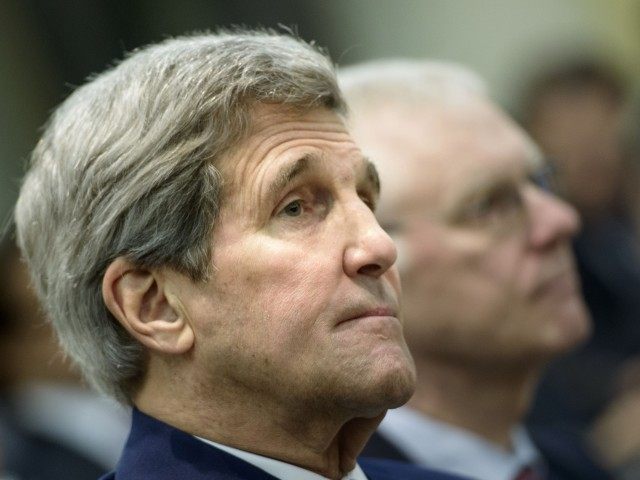A new article by veteran reporter John L. Allen blasts John Kerry and the State Department for radically discounting Christian persecution its recent Country Reports on Human Rights Practices for 2014.
Allen, author of the 2013 bestselling book The Global War on Christians, finds that in general, “religion is undervalued throughout the State Department report” and that part of this undervaluing comes from the administration’s demotion of religious liberty to a second-class right. While listing seven categories of human rights problems, it treats religious freedom “as a mere sub-heading” under respect for civil liberties.
In the light of fierce religious liberty battles in the United States, the State Department’s conscious decision to downgrade religious freedom does not bode well for people of faith in America. Saint John Paul II famously referred to religious liberty as “the source and synthesis” of all human rights, since it means “the right to live in the truth of one’s faith and in conformity with one’s transcendent dignity as a person.” When it is treated as a mere afterthought rather than the foundational right it is, religious liberty will always be trumped by other rights.
As an illustration, Allen takes the egregious example of Egypt, where “Christians are the largest and most embattled minority,” noting that “any account of the human rights situation that fails to feature their hardships is seriously incomplete.” Yet this is exactly what the new State Department report does.
The article, title “John Kerry needs a lesson on anti-Christian persecution in Egypt,” enumerates copious examples of barbarous Christian persecution that somehow escaped the unwatchful eyes of the State Department.
Summing up an entire year of human rights violations in Egypt, the report remarkably “cites only one instance of a Christian suffering discrimination,” involving a man charged under anti-blasphemy laws for “liking” a Facebook page critical of Islam.
Of the multiple abuses absent from the State Department report, Allen cites the case of a Coptic Christian named Nabil Soliman, whose house was burned down by a mob in a small Upper Egyptian town called Nazlet el-Badraman in November 2013. Soliman and his wife Sabah, along with their six children were forced to flee the religiously-motivated persecution and settle in another area completely.
The Muslim government then threw Soliman in jail on a trumped-up murder charge for supposedly killing a ruffian who wasn’t even in the same town as Soliman at the time. Even the family of the dead man has acknowledged that the charge has no merits.
In his analysis, Allen finds the omission of this very public story and others like it from the State Department account “both puzzling and alarming.”
If the suffering of Egyptian Christians isn’t worthy of serious American concern, Allen writes, especially since it comes in a country that’s the second-largest recipient of U.S. military and economic aid in the world, “then it’s hard to know what such an outrage might look like.”
It is illustrative to compare the State Department’s treatment of Egypt with the report released by the independent U.S. Commission on International Religious Freedom (USCIRF).
As it has done for the last five years, USCIRF places Egypt on its highest tier of religious freedom violations, designating it a “country of particular concern,” or CPC, under the International Religious Freedom Act (IRFA). The denomination as a “country of particular concern”—the former “Watch List—refers to those countries “whose government engages in or tolerates particularly severe violations of religious freedom that are systematic, ongoing and egregious.”
In being listed as a CPC, Egypt keeps company with such countries as Iran, Iraq, North Korea, China, Pakistan and Vietnam, all notorious for their blatant suppression of religious freedom.
According to the USCIRF report, the Egyptian government has not adequately protected religious minorities, particularly Coptic Christians, from violence. It moreover continues to maintain discriminatory and repressive laws and policies “that restrict freedom of thought, conscience, and religion or belief,” while Egyptian courts “continue to prosecute, convict, and imprison Egyptian citizens for blasphemy.”
Somehow all of this was lost on the State Department in its treatment of human rights abuses in Egypt.
This situation certainly bodes poorly for Christians in Egypt, but it also sends a grave message to the American people: that the present administration cares little for people of faith, and persecuted Christians in particular.
Follow Thomas D. Williams on Twitter: @tdwilliamsrome

COMMENTS
Please let us know if you're having issues with commenting.